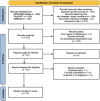Interventions for anxiety and depression in patients with atopic dermatitis: a systematic review and meta-analysis
- PMID: 38632375
- PMCID: PMC11024101
- DOI: 10.1038/s41598-024-59162-9
Interventions for anxiety and depression in patients with atopic dermatitis: a systematic review and meta-analysis
Abstract
Atopic dermatitis (AD) is a chronic inflammatory skin disease that is associated with anxiety and depression. Few studies have addressed interventions for symptoms of anxiety and depression in this population. To determine the efficacy of interventions for anxiety and depression in patients with AD. PubMed, MEDLINE, EMBASE, and PsycINFO were searched from inception to November 2023. English-language studies published in peer-reviewed journals evaluating the effect of interventions on anxiety and/or depression using validated assessment tools on patients with AD were included. Titles, abstracts, and articles were screened by at least two independent reviewers. Of 1410 references that resulted in the initial search, 17 studies were included. Fourteen of these studies are randomized controlled trials, while the other 3 studies are prospective controlled trials with pre and post-test designs. Data were extracted using a standardized extraction form, and the Preferred Reporting Items for Systematic Reviews and Meta-analyses (PRISMA) guidelines were followed. To accommodate trials with multiple interventions (each compared to a control group), we conducted a mixed-effects meta-analysis with the trial as a random effect. Prespecified outcomes were changes in symptoms of anxiety and depression in patients with AD as evaluated using standardized assessment tools. Of the 17 studies included in this systematic review, 7 pharmacological intervention studies with 4723 participants examining 5 different medications were included in a meta-analysis. Of these studies, only 1 study evaluated medications prescribed to treat anxiety and/or depression; the rest evaluated medications prescribed to treat AD. Meta-analysis of all the pharmacological interventions resulted in significant improvement in anxiety, depression, and combined anxiety-depression scale scores (standardized mean difference [95% CI]: - 0.29 [- 0.49 to - 0.09], - 0.27 [- 0.45 to - 0.08], - 0.27 [- 0.45 to - 0.08]) respectively. The 10 non-pharmacological studies with 2058 participants showed general improvement in anxiety but not depression. A meta-analysis of the non-pharmacological interventions was not conducted due to variable approaches and limited data. Pharmacological interventions designed to improve AD were found to improve anxiety and depression in patients with moderate-severe disease. More comprehensive studies on non-pharmacological and pharmacological interventions that primarily target anxiety and depression are needed.
Keywords: Anxiety; Atopic dermatitis; Depression; Eczema.
© 2024. This is a U.S. Government work and not under copyright protection in the US; foreign copyright protection may apply.
Conflict of interest statement
The authors declare no competing interests.
Figures






References
-
- Kage P, Simon JC, Treudler R. Atopic dermatitis and psychosocial comorbidities. J. Dtsch. Dermatol. Ges. 2020;18(2):93–102. - PubMed
-
- Dalgard FJ, Gieler U, Tomas-Aragones L, Lien L, Poot F, Jemec GBE, et al. The psychological burden of skin diseases: A cross-sectional multicenter study among dermatological out-patients in 13 European countries. J. Invest. Dermatol. 2015;135(4):984–991. doi: 10.1038/jid.2014.530. - DOI - PMC - PubMed

